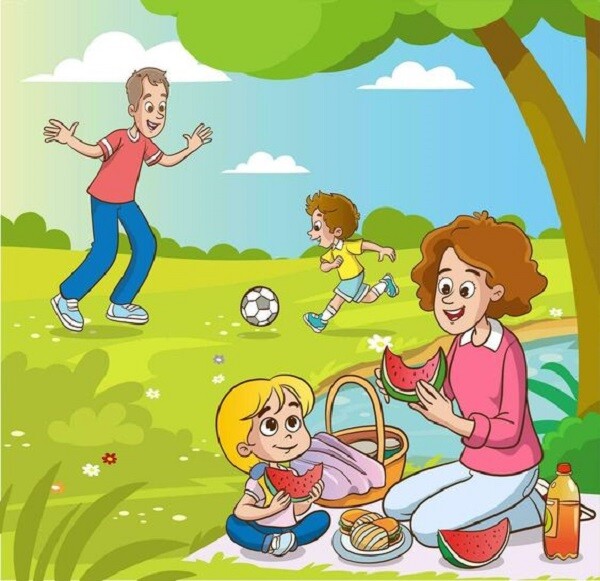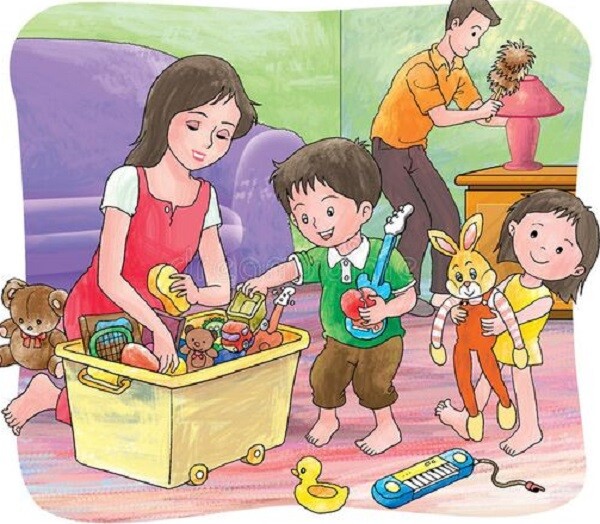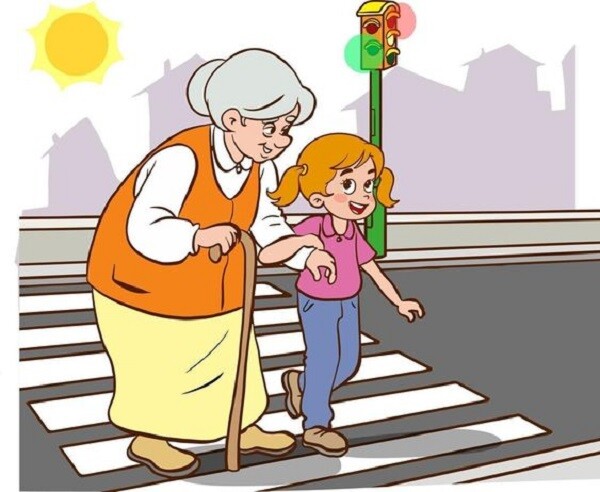This is a crucial stage for parents to establish rules and discipline for their children. Without proper guidance, it will be more challenging to correct bad habits as they enter their teenage years.
Thus, Professor Li Meijin, a renowned psychologist, encourages parents to directly care for their children and establish the following rules before they turn six years old.

Do not touch others’ belongings without permission
As your child grows up, teach them the concept of “yours and mine.” Help them understand the boundaries between their possessions and those of others. For instance, boys should only use the male restroom, while girls should use the female restroom.
Even if your child really likes something that belongs to someone else, they should not touch it without permission. These are fundamental lessons in teaching your child about respect and privacy, both for themselves and others.
Guiding your child to develop a healthy lifestyle and respect for themselves and those around them will not only contribute to their safety but also help them become a good family member.

Children must ask for permission before touching others’ belongings.

Take initiative and don’t rely on your parents for everything
Many children depend on their parents for everything, and some parents consider this normal. However, Professor Li suggests that parents should teach their children to take the initiative and not rely on them for everything.
Overprotective parenting can lead to children becoming overly dependent and lacking independence. Children need to develop their independent thinking and problem-solving skills from an early age. This will help them acquire essential life skills and build a solid foundation to confidently face life’s challenges.
Occasionally, offer your child small suggestions to make choices and solve problems. It is crucial for your child to have their own opinions. Parents should learn to let go appropriately while accompanying their children on their journey to adulthood and independence. When given autonomy, children will develop a sense of responsibility, confidence, and effective problem-solving skills.

Take initiative and do things independently.

Put things back where they belong
Many parents complain that their children leave their toys scattered everywhere, expecting others to clean up after them.
In such cases, parents should teach their children that the house belongs to everyone in the family. A clean and tidy home brings happiness to all, while a messy one can affect our mood. Therefore, children should learn to put things back in their proper places after playing with them.
Children need to be taught a sense of responsibility for maintaining order and cleanliness in the home. This is not just a chore but also a way for them to learn independence and organize their lives. When children get used to tidying up after playing, they will develop neatness and cleanliness habits, which will benefit their future development.
Parents need to be patient in guiding and encouraging their children to perform this task well. Instead of intervening immediately, allow them to take the initiative and make adjustments as needed. Only by giving them autonomy can they develop a sense of self-discipline and personal responsibility.
A neat and orderly home not only provides comfort but also instills qualities such as carefulness, discipline, and responsibility in children, which are essential for their growth.

Follow the order: first come, first served
Maintaining order is very important. Children should follow instructions and be aware of the importance of queuing without pushing or shoving.
Discipline and order are the foundations for a child’s holistic development. Following the proper order, queuing, and behaving appropriately are prerequisites for social integration and learning to respect others’ rights.
When engaging in public activities such as riding the bus or train, going through security checks, or dining out, parents should teach their children to queue in an orderly manner and wait for their turn. Pushing, shoving, or causing a disturbance is unacceptable. This creates a safe and comfortable environment for everyone and teaches children discipline and respect for others.
Through simple acts like queuing, children will gradually understand the importance of order and discipline. These skills will stay with them throughout their lives, fostering a sense of self-discipline and responsibility towards the community.

Follow the order: first come, first served.

Be considerate and respectful of others
Teaching children to follow and respect rules should also be applied in the family setting. For example, when children want to use electronic devices like tablets or watch TV, they should first ask their parents for permission. If allowed, they should also be taught to lower the volume and close the door to avoid disturbing other family members.
These simple acts teach children to be respectful, disciplined, self-controlled, and responsible. When equipped with these skills from a young age, they will become habits and form the foundation for developing other positive qualities, such as being thoughtful, considerate, and respectful of others.
Additionally, allowing children to self-regulate their behavior helps build a trusting relationship with them. They will feel respected and responsible instead of being forced to follow rules rigidly.

Apologize when you make a mistake
Mistakes are inevitable, and a child’s growth involves a continuous process of making mistakes and improving.
Within the family, both adults and children should apologize when they are wrong. If parents make a mistake, they should apologize to their children. Likewise, if a child hurts their parents, they must apologize. Apologizing shows respect, rectifies mistakes, and strengthens family relationships.

Help others when they are in need.
In reality, it is normal for children to make mistakes, but they must acknowledge them and be determined to correct them. Instead of hiding or blaming, parents should teach their children to recognize their mistakes, take responsibility, and make amends. This will help them mature, creating a healthy family environment where all members feel supported, understood, and trusted.
This process is not easy, but it will lay the foundation for children to develop a healthy personality, learn to solve problems, and continue to improve themselves. After all, maturity is not a destination but a precious journey, and the family is where children learn the most valuable lessons.

Always say thank you, be polite, and show gratitude
Many parents feel that there is no need for politeness within the family. As a result, when their child helps them with something, they don’t feel the need to say thank you, and vice versa. This can lead to children taking the help of others for granted.
What’s truly important is teaching your child to say thank you frequently and becoming a polite and grateful individual. Saying things like, “Thank you for cleaning your room” or “Thank you for cooking such a delicious dinner” not only shows politeness but also contributes to building a close and understanding family relationship.

Always say thank you, be polite, and show gratitude.
When children are taught to be polite and grateful, they will learn to care for others and express their appreciation naturally. This fosters good family relationships and helps children develop communication skills, leaving a positive impression on those around them.
Moreover, saying thank you teaches children to appreciate their parents’ and family members’ efforts and sacrifices. This is the first step in teaching children gratitude, compassion, and maturity, helping them develop beautiful qualities.
“Even With All the Love in the World, There Are 3 Things Parents Should Never Give In To”
“When children make unreasonable demands, it is essential for parents to firmly but gently deny these requests and guide their little ones towards understanding the difference between wants and needs. It is a delicate balance between setting boundaries and teaching them about the world around them.”





































